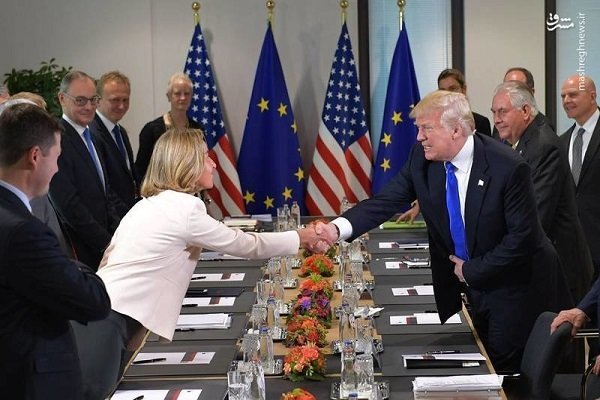Washington-Brussels parallel talks over the JCPOA

Recently, French President Emmanuel Macron has taken a controversial position on the nuclear deal with Iran. On a telephone call to Hassan Rouhani, the President of the Islamic Republic of Iran, which was 48 hours after the official announcement of Trump’s withdrawal from the Joint Comprehensive Plan of Action (JCPOA), he stressed his commitment to the nuclear deal, and in turn, he asked Iran to be committed to the agreement.
This demand was made by Emmanuel Macron: The first European politician who agreed to change the nuclear deal by including subjects such as limiting Iran's missile capability and making Iran's nuclear restriction permanent! He announced his agreement with these conditions in August 2017.
This was while under the deal signed in Vienna with six countries, the U.S., UK, France, Germany, Russia, China and the European Union, Iran was committed to halt its uranium enrichment program, and in exchange, international sanctions were to be lifted, allowing our country to sell oil and gas worldwide. United Nations inspectors have repeatedly confirmed Iran's commitment the deal. Then we had the U.S. government unilaterally walking out of the nuclear deal, and Macron has since adopted a vague approach to "the JCPOA without the U.S." This ambiguous approach, on the one hand, is the result of the French President’s attempt to restore his international reputation, and on the other hand, is due to the hidden talks between the United States and France over the JCPOA.
Today Macron is speaking of his country's commitment to the "current version of the JCPOA". In a joint statement issued by the European troika’s authorities we read:
It is with regret and concern that we, the Leaders of France, Germany and the United Kingdom take note of President Trump’s decision to withdraw the United States of America from the Joint Comprehensive Plan of Action. Together, we emphasize our continuing commitment to the JCPOA. This agreement remains important for our shared security. We recall that the JCPOA was unanimously endorsed by the UN Security Council in resolution 2231. This resolution remains the binding international legal framework for the resolution of the dispute about the Iranian nuclear program. We urge all sides to remain committed to its full implementation and to act in a spirit of responsibility.
In spite of this statement, we’re witnessing that French officials don’t necessarily consider it important to be “that committed” to the deal. This could point to a dangerous tactical game played by the Elysees Palace! The paradoxical positions of Macron and the French officials towards the JCPOA show that Iran can’t, and shouldn’t count on the support of the Elysee Palace for the nuclear deal. It should not be forgotten that between August 2017 and April 2018, there were intense negotiations between U.S. and European experts and diplomats on changing the nuclear agreement. During that time, Macron repeatedly emphasized the need to "maintain the nuclear accord," but in practice he agreed with all the terms and conditions of the U.S. President to change the JCPOA.
The fact is that the main concern of the French President is to manage and direct the relations between Paris and Washington under the North Atlantic Treaty. In this equation, France is looking at "the JCPOA" merely as a leverage. What really matters to the French authorities is to prevent the existing "gap" between the United States and Europe from becoming a "conflict." In his recent remarks, Macron insisted that there shouldn’t be a dispute between the two sides of the Atlantic (Europe and the United States) over the JCPOA and The U.S. withdrawal from it. Therefore, maintaining the nuclear deal with Iran isn’t important for the French president, but it’s more about managing the transatlantic relations. Subsequently, it is obvious that the JCPOA isn’t actually considered an "independent variable" for France in this equation!
On the other hand, France support and that of the European Union for the JCPOA is motivated primarily by self-interest: valuable trade with Iran. The European Union was Iran’s largest trade partner before the imposition of sanctions and clearly has an interest in recovering that position. As for France, the country’s trade with Iran collapsed after sanctions were imposed in 2006. When those sanctions were lifted, France-Iran trade grew 118 percent from January to October 2017, compared to the same time frame the previous year.
The fact is that Immanuel Macron, Angela Merkel and Theresa May, as the three top European politicians, have made the nuclear deal with Iran an issue for tactical bargains with the Trump government. Therefore, we could never see the European troika taking a determined position in defense of the JCPOA.
Will Washington and Europe finally bargain on the JCPOA?
Lately, U.S. Secretary of State Mike Pompeo has announced that intense talks are underway between Washington and its partners (European troika) on the nuclear deal with Iran and its fate. In other words, in spite of Washington walking out of the JCPOA, the United States and Europe continue to hold talks on it! In this equation, "Emmanuel Macron" once again plays a bold role, just like previous times. Although the French authorities have claimed that they are in talks with Iran over "maintaining the JCPOA", but they have never spoken of parallel talks with American officials, and in particular, the U.S. Secretary of State Mike Pompeo. This is another indication that French officials can’t be in no way trusted in this equation. Taking the French’s records into consideration (especially over recent years) we come to conclude that they are well capable to deal with the United States over our interests, and they are even potentially ready to indirectly support for the thorough cancellation of the nuclear deal in the near future. Emanuel Macron was practically deceived by Trump's promises during his talks with the American authorities. And this experience can be repeated in future.
